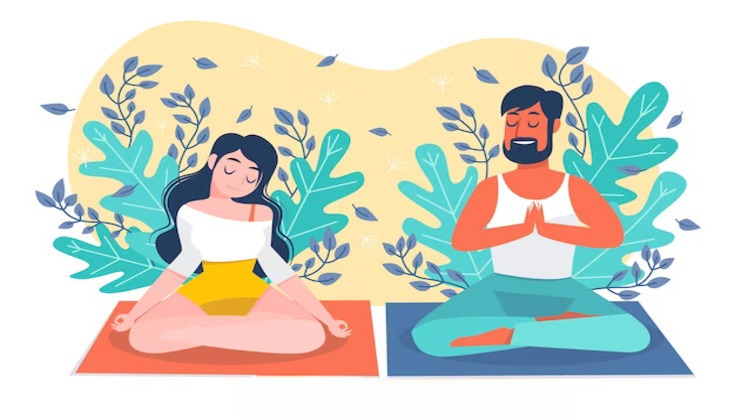Meditation and depression are mental health conditions characterized by persistent feelings of sadness, hopelessness, and a loss of interest in activities that a person used to enjoy. It can affect a person’s thoughts, feelings, behaviors, and physical health.
Meditation and depression can occur as a result of various factors, including biological, environmental, and psychological factors. It can be triggered by stressful life events, such as the loss of a loved one, a relationship breakup, or a change in circumstances.
Depression can be treated with a combination of psychotherapy, medication, and lifestyle changes. It’s important for people who are experiencing symptoms of depression to seek help from a mental health professional, as depression can have long-term effects on a person’s health and well-being if left untreated.
Meditation and depression
A mental exercise called meditation includes teaching the mind to concentrate and reroute its thoughts. It is often used as a tool for stress reduction, relaxation, and improving overall well-being.
Although there are numerous varieties of meditation, some of the more popular ones are as follows:
1. Mindfulness meditation: This involves paying attention to the present moment without judgment, and focusing on the breath or bodily sensations. Discover inner peace and overcome depression through our “Online therapy” program, blending the power of meditation and professional guidance
2. Transcendental meditation: This involves using a mantra, word, or phrase, to help focus the mind and achieve a state of deep relaxation.
3. Loving-kindness meditation: This involves cultivating feelings of love and compassion towards oneself and others.
4. Body scan meditation: This involves focusing on different parts of the body and noticing physical sensations.
5. Yoga and movement meditation: This involves combining physical movement with meditative focus, such as in yoga or tai chi.
Meditation and depression have been shown to have many benefits, including reducing stress and anxiety, improving sleep, increasing feelings of well-being, and enhancing concentration and focus. It has also been shown to have physical health benefits, such as reducing blood pressure and improving immune system function.
Meditation and depression can be practiced by people of all ages and backgrounds and can be done anywhere, anytime. It’s important to find a type of meditation that works for you and to make it a regular part of your routine in order to experience the full benefits.
Benefits of meditation when you are depressed
People who are depressed may find that meditation is a useful technique. Here are some of the benefits of meditation for depression:
1. Reducing symptoms of depression: Meditation has been shown to reduce symptoms of depression by helping people to regulate their emotions and increase their sense of well-being. Experience the transformative benefits of “Online counselling”, designed to alleviate symptoms of depression and enhance well-being through tailored meditation techniques.
2. Improving mood: Meditation can help to improve mood by increasing the production of serotonin and dopamine in the brain, which are neurotransmitters associated with happiness and well-being.
3. Reducing stress and anxiety: Meditation and depression have been shown to reduce levels of stress and anxiety, which can be helpful for people who are experiencing depression.
4. Enhancing self-awareness: Meditation and depression can help to increase self-awareness, which can be helpful for recognizing negative thought patterns and behaviors that contribute to depression.
5. Improving sleep: Meditation can improve sleep quality and reduce insomnia, which can be helpful for people who are experiencing depression-related sleep disturbances.
6. Enhancing resilience: Meditation can help to enhance resilience and improve coping skills, which can be helpful for managing the symptoms of depression and preventing relapse.
How can I try it for meditation when depressed?
If you’re interested in trying meditation to help with depression, here are some tips to get started:
1. Find a quiet and comfortable space: Choose a quiet space where you can sit comfortably for a few minutes without being disturbed. You can sit in a chair, on the floor, or use a cushion or meditation bench.
2. Choose a type of meditation: There are many different types of meditation, so try a few to see which one works best for you. Mindfulness meditation, loving-kindness meditation, and body scan meditation are a few popular varieties of meditation.
3. Start with short sessions: If you’re new to meditation, start with short sessions of just a few minutes at a time. As you get more at ease with the practice, you can gradually lengthen your sessions.
4. Pay attention to your breath. This is one of the most popular meditation techniques. Simply sit quietly and focus on your breath as it goes in and out of your nose or mouth. Bring your focus back to your breath if it begins to stray.
5. Be kind to yourself: It’s common for the mind to wander during meditation, and this is normal. If it takes a while for you to focus at first, don’t be hard on yourself or become upset. Just gently bring your attention back to the present moment and your breath.
6. Try guided meditations: If you’re having trouble getting started, try using a guided meditation app or video.
